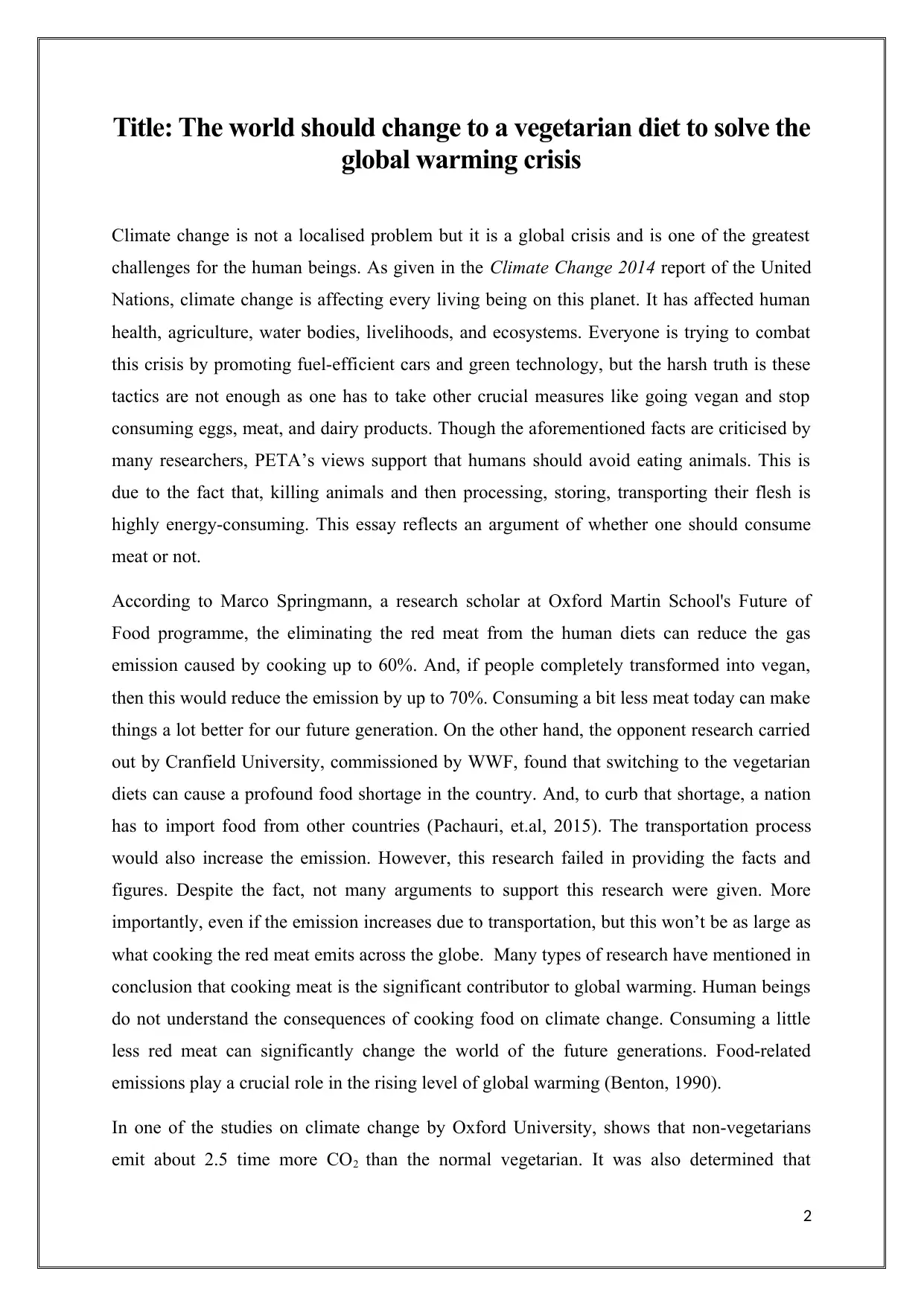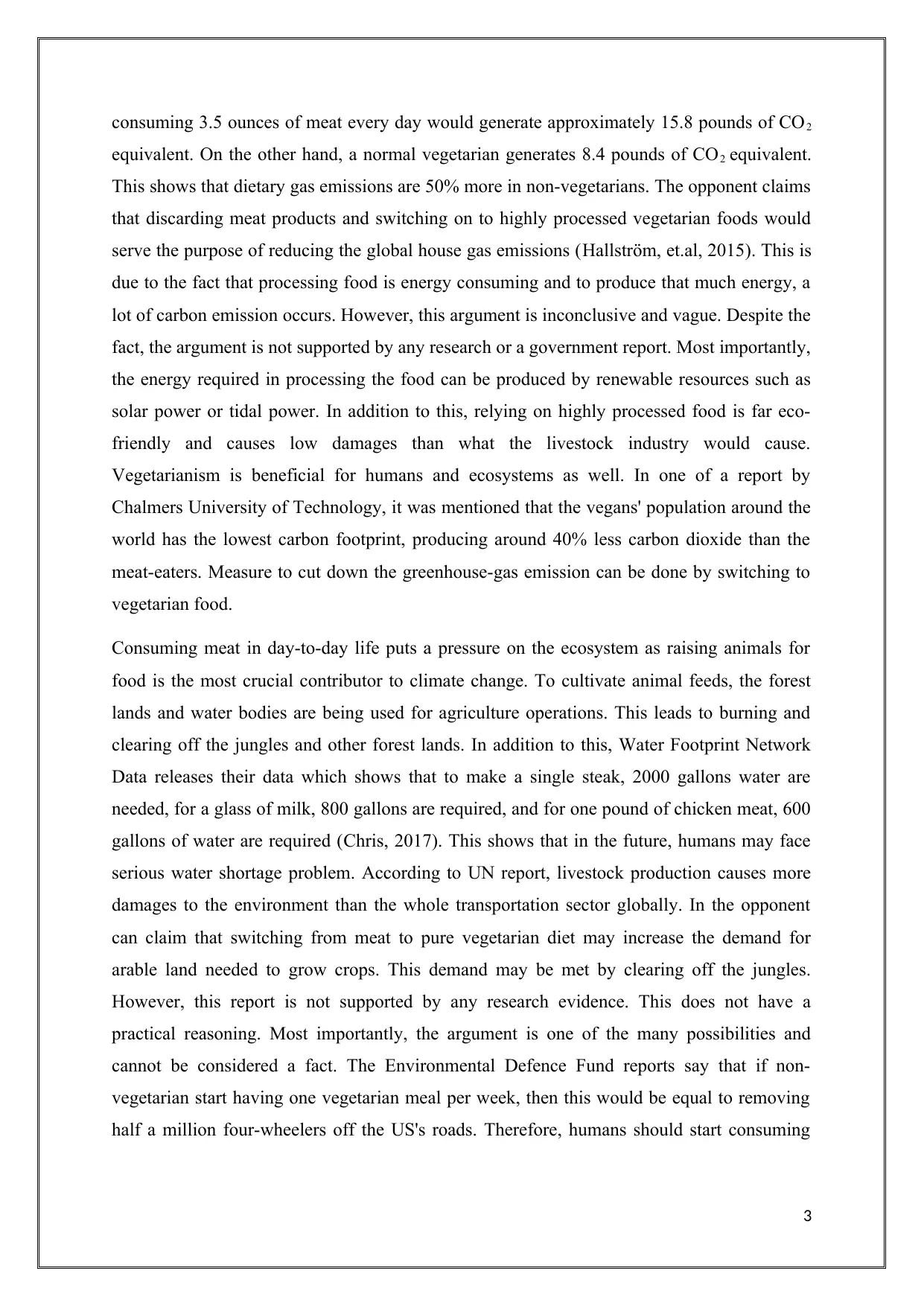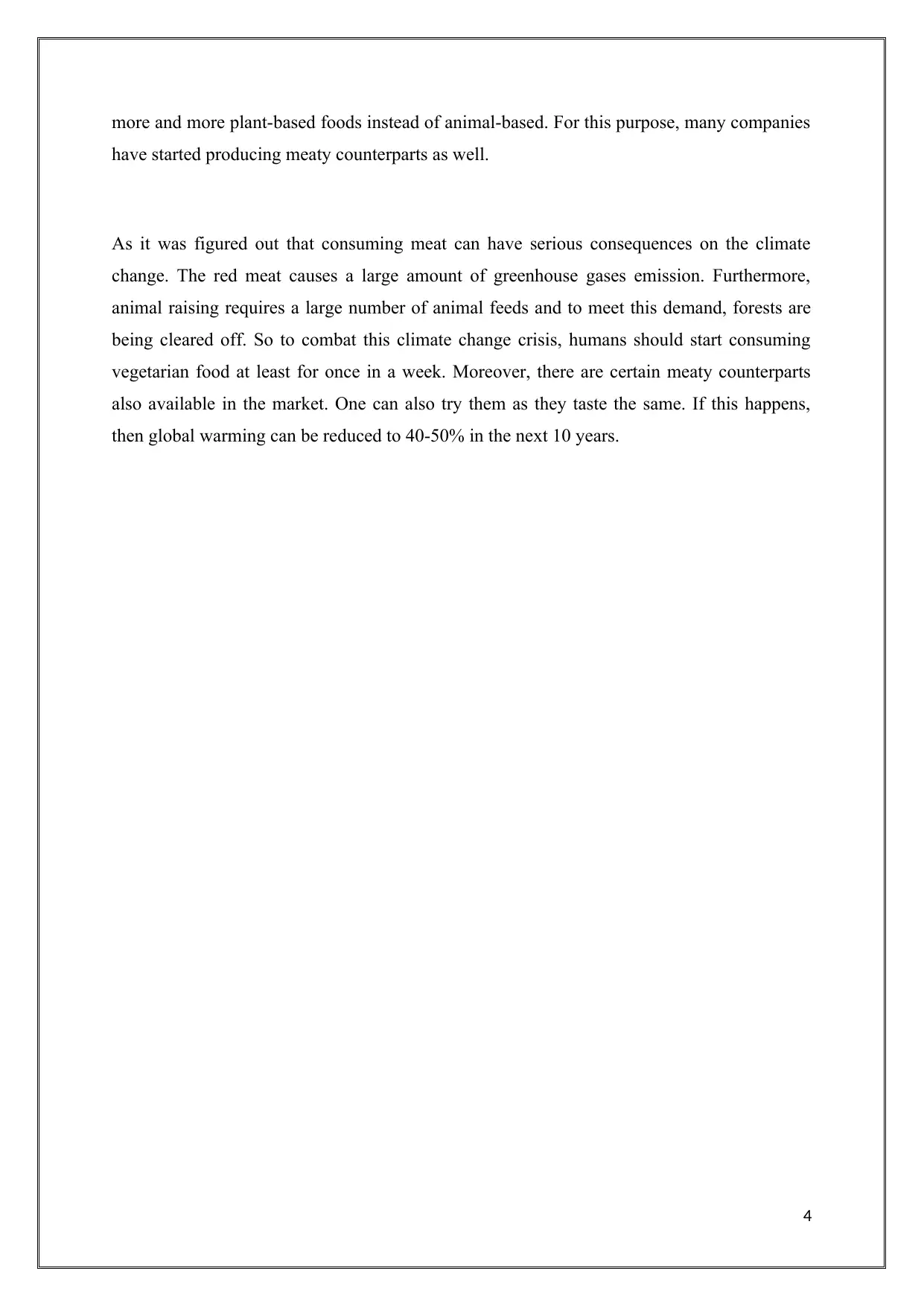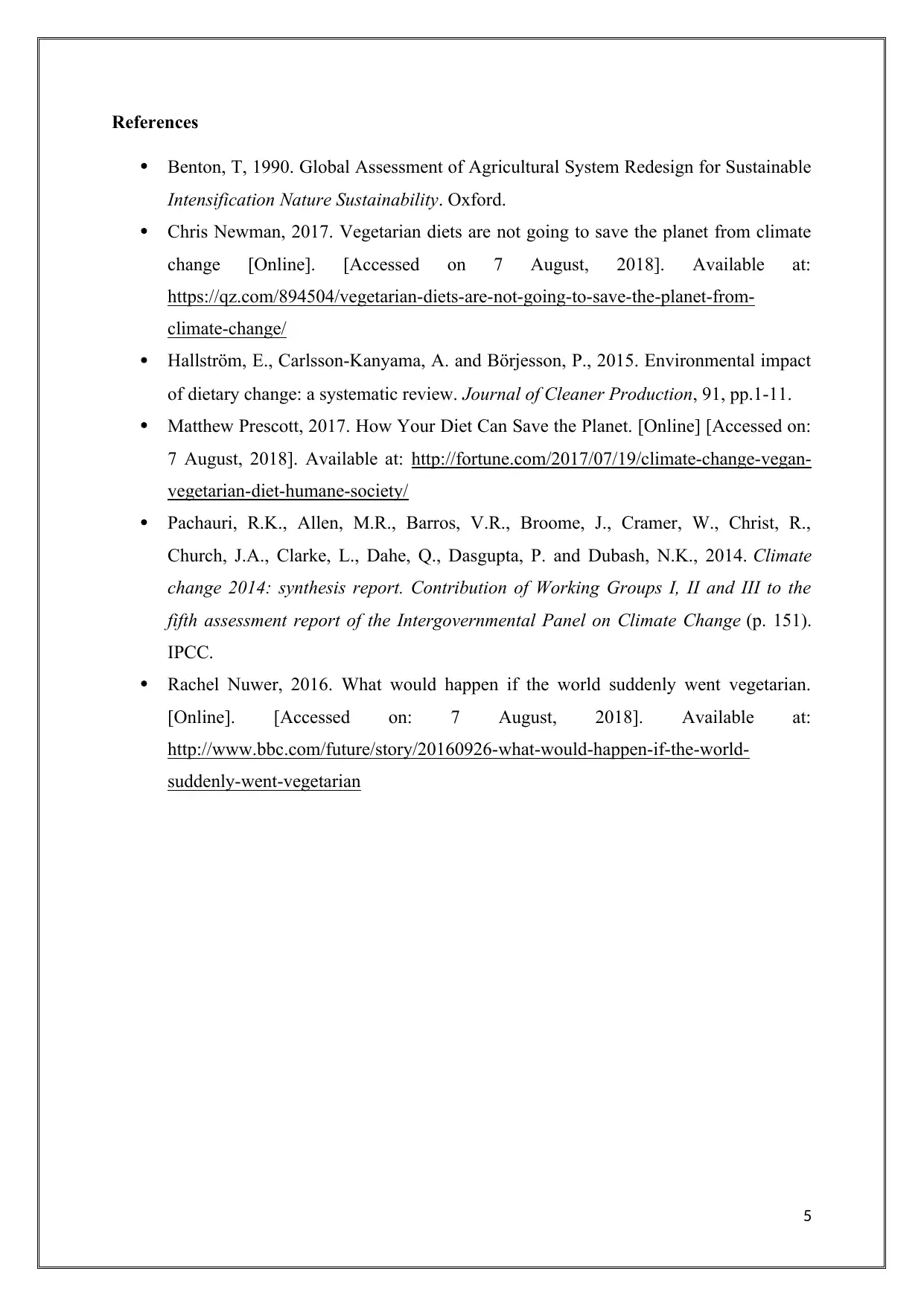Analyzing Vegetarianism as a Solution to Global Warming Crisis
VerifiedAdded on 2024/07/03
|5
|1391
|204
Essay
AI Summary
This essay argues that adopting a vegetarian diet globally could significantly mitigate the global warming crisis. It highlights the high energy consumption associated with meat production, processing, and transportation, contrasting it with the lower emissions from plant-based diets. While acknowledging counterarguments about potential food shortages and increased emissions from transporting vegetarian foods, the essay emphasizes that the overall impact of meat consumption on greenhouse gas emissions is substantially greater. It cites research indicating that non-vegetarians emit significantly more CO2 than vegetarians and underscores the environmental damage caused by livestock production, including deforestation and water usage. The essay concludes by advocating for increased consumption of plant-based foods and exploring meat alternatives as viable solutions to reduce global warming.

Essay
1
1
Paraphrase This Document
Need a fresh take? Get an instant paraphrase of this document with our AI Paraphraser

Title: The world should change to a vegetarian diet to solve the
global warming crisis
Climate change is not a localised problem but it is a global crisis and is one of the greatest
challenges for the human beings. As given in the Climate Change 2014 report of the United
Nations, climate change is affecting every living being on this planet. It has affected human
health, agriculture, water bodies, livelihoods, and ecosystems. Everyone is trying to combat
this crisis by promoting fuel-efficient cars and green technology, but the harsh truth is these
tactics are not enough as one has to take other crucial measures like going vegan and stop
consuming eggs, meat, and dairy products. Though the aforementioned facts are criticised by
many researchers, PETA’s views support that humans should avoid eating animals. This is
due to the fact that, killing animals and then processing, storing, transporting their flesh is
highly energy-consuming. This essay reflects an argument of whether one should consume
meat or not.
According to Marco Springmann, a research scholar at Oxford Martin School's Future of
Food programme, the eliminating the red meat from the human diets can reduce the gas
emission caused by cooking up to 60%. And, if people completely transformed into vegan,
then this would reduce the emission by up to 70%. Consuming a bit less meat today can make
things a lot better for our future generation. On the other hand, the opponent research carried
out by Cranfield University, commissioned by WWF, found that switching to the vegetarian
diets can cause a profound food shortage in the country. And, to curb that shortage, a nation
has to import food from other countries (Pachauri, et.al, 2015). The transportation process
would also increase the emission. However, this research failed in providing the facts and
figures. Despite the fact, not many arguments to support this research were given. More
importantly, even if the emission increases due to transportation, but this won’t be as large as
what cooking the red meat emits across the globe. Many types of research have mentioned in
conclusion that cooking meat is the significant contributor to global warming. Human beings
do not understand the consequences of cooking food on climate change. Consuming a little
less red meat can significantly change the world of the future generations. Food-related
emissions play a crucial role in the rising level of global warming (Benton, 1990).
In one of the studies on climate change by Oxford University, shows that non-vegetarians
emit about 2.5 time more CO2 than the normal vegetarian. It was also determined that
2
global warming crisis
Climate change is not a localised problem but it is a global crisis and is one of the greatest
challenges for the human beings. As given in the Climate Change 2014 report of the United
Nations, climate change is affecting every living being on this planet. It has affected human
health, agriculture, water bodies, livelihoods, and ecosystems. Everyone is trying to combat
this crisis by promoting fuel-efficient cars and green technology, but the harsh truth is these
tactics are not enough as one has to take other crucial measures like going vegan and stop
consuming eggs, meat, and dairy products. Though the aforementioned facts are criticised by
many researchers, PETA’s views support that humans should avoid eating animals. This is
due to the fact that, killing animals and then processing, storing, transporting their flesh is
highly energy-consuming. This essay reflects an argument of whether one should consume
meat or not.
According to Marco Springmann, a research scholar at Oxford Martin School's Future of
Food programme, the eliminating the red meat from the human diets can reduce the gas
emission caused by cooking up to 60%. And, if people completely transformed into vegan,
then this would reduce the emission by up to 70%. Consuming a bit less meat today can make
things a lot better for our future generation. On the other hand, the opponent research carried
out by Cranfield University, commissioned by WWF, found that switching to the vegetarian
diets can cause a profound food shortage in the country. And, to curb that shortage, a nation
has to import food from other countries (Pachauri, et.al, 2015). The transportation process
would also increase the emission. However, this research failed in providing the facts and
figures. Despite the fact, not many arguments to support this research were given. More
importantly, even if the emission increases due to transportation, but this won’t be as large as
what cooking the red meat emits across the globe. Many types of research have mentioned in
conclusion that cooking meat is the significant contributor to global warming. Human beings
do not understand the consequences of cooking food on climate change. Consuming a little
less red meat can significantly change the world of the future generations. Food-related
emissions play a crucial role in the rising level of global warming (Benton, 1990).
In one of the studies on climate change by Oxford University, shows that non-vegetarians
emit about 2.5 time more CO2 than the normal vegetarian. It was also determined that
2

consuming 3.5 ounces of meat every day would generate approximately 15.8 pounds of CO2
equivalent. On the other hand, a normal vegetarian generates 8.4 pounds of CO2 equivalent.
This shows that dietary gas emissions are 50% more in non-vegetarians. The opponent claims
that discarding meat products and switching on to highly processed vegetarian foods would
serve the purpose of reducing the global house gas emissions (Hallström, et.al, 2015). This is
due to the fact that processing food is energy consuming and to produce that much energy, a
lot of carbon emission occurs. However, this argument is inconclusive and vague. Despite the
fact, the argument is not supported by any research or a government report. Most importantly,
the energy required in processing the food can be produced by renewable resources such as
solar power or tidal power. In addition to this, relying on highly processed food is far eco-
friendly and causes low damages than what the livestock industry would cause.
Vegetarianism is beneficial for humans and ecosystems as well. In one of a report by
Chalmers University of Technology, it was mentioned that the vegans' population around the
world has the lowest carbon footprint, producing around 40% less carbon dioxide than the
meat-eaters. Measure to cut down the greenhouse-gas emission can be done by switching to
vegetarian food.
Consuming meat in day-to-day life puts a pressure on the ecosystem as raising animals for
food is the most crucial contributor to climate change. To cultivate animal feeds, the forest
lands and water bodies are being used for agriculture operations. This leads to burning and
clearing off the jungles and other forest lands. In addition to this, Water Footprint Network
Data releases their data which shows that to make a single steak, 2000 gallons water are
needed, for a glass of milk, 800 gallons are required, and for one pound of chicken meat, 600
gallons of water are required (Chris, 2017). This shows that in the future, humans may face
serious water shortage problem. According to UN report, livestock production causes more
damages to the environment than the whole transportation sector globally. In the opponent
can claim that switching from meat to pure vegetarian diet may increase the demand for
arable land needed to grow crops. This demand may be met by clearing off the jungles.
However, this report is not supported by any research evidence. This does not have a
practical reasoning. Most importantly, the argument is one of the many possibilities and
cannot be considered a fact. The Environmental Defence Fund reports say that if non-
vegetarian start having one vegetarian meal per week, then this would be equal to removing
half a million four-wheelers off the US's roads. Therefore, humans should start consuming
3
equivalent. On the other hand, a normal vegetarian generates 8.4 pounds of CO2 equivalent.
This shows that dietary gas emissions are 50% more in non-vegetarians. The opponent claims
that discarding meat products and switching on to highly processed vegetarian foods would
serve the purpose of reducing the global house gas emissions (Hallström, et.al, 2015). This is
due to the fact that processing food is energy consuming and to produce that much energy, a
lot of carbon emission occurs. However, this argument is inconclusive and vague. Despite the
fact, the argument is not supported by any research or a government report. Most importantly,
the energy required in processing the food can be produced by renewable resources such as
solar power or tidal power. In addition to this, relying on highly processed food is far eco-
friendly and causes low damages than what the livestock industry would cause.
Vegetarianism is beneficial for humans and ecosystems as well. In one of a report by
Chalmers University of Technology, it was mentioned that the vegans' population around the
world has the lowest carbon footprint, producing around 40% less carbon dioxide than the
meat-eaters. Measure to cut down the greenhouse-gas emission can be done by switching to
vegetarian food.
Consuming meat in day-to-day life puts a pressure on the ecosystem as raising animals for
food is the most crucial contributor to climate change. To cultivate animal feeds, the forest
lands and water bodies are being used for agriculture operations. This leads to burning and
clearing off the jungles and other forest lands. In addition to this, Water Footprint Network
Data releases their data which shows that to make a single steak, 2000 gallons water are
needed, for a glass of milk, 800 gallons are required, and for one pound of chicken meat, 600
gallons of water are required (Chris, 2017). This shows that in the future, humans may face
serious water shortage problem. According to UN report, livestock production causes more
damages to the environment than the whole transportation sector globally. In the opponent
can claim that switching from meat to pure vegetarian diet may increase the demand for
arable land needed to grow crops. This demand may be met by clearing off the jungles.
However, this report is not supported by any research evidence. This does not have a
practical reasoning. Most importantly, the argument is one of the many possibilities and
cannot be considered a fact. The Environmental Defence Fund reports say that if non-
vegetarian start having one vegetarian meal per week, then this would be equal to removing
half a million four-wheelers off the US's roads. Therefore, humans should start consuming
3
⊘ This is a preview!⊘
Do you want full access?
Subscribe today to unlock all pages.

Trusted by 1+ million students worldwide

more and more plant-based foods instead of animal-based. For this purpose, many companies
have started producing meaty counterparts as well.
As it was figured out that consuming meat can have serious consequences on the climate
change. The red meat causes a large amount of greenhouse gases emission. Furthermore,
animal raising requires a large number of animal feeds and to meet this demand, forests are
being cleared off. So to combat this climate change crisis, humans should start consuming
vegetarian food at least for once in a week. Moreover, there are certain meaty counterparts
also available in the market. One can also try them as they taste the same. If this happens,
then global warming can be reduced to 40-50% in the next 10 years.
4
have started producing meaty counterparts as well.
As it was figured out that consuming meat can have serious consequences on the climate
change. The red meat causes a large amount of greenhouse gases emission. Furthermore,
animal raising requires a large number of animal feeds and to meet this demand, forests are
being cleared off. So to combat this climate change crisis, humans should start consuming
vegetarian food at least for once in a week. Moreover, there are certain meaty counterparts
also available in the market. One can also try them as they taste the same. If this happens,
then global warming can be reduced to 40-50% in the next 10 years.
4
Paraphrase This Document
Need a fresh take? Get an instant paraphrase of this document with our AI Paraphraser

References
Benton, T, 1990. Global Assessment of Agricultural System Redesign for Sustainable
Intensification Nature Sustainability. Oxford.
Chris Newman, 2017. Vegetarian diets are not going to save the planet from climate
change [Online]. [Accessed on 7 August, 2018]. Available at:
https://qz.com/894504/vegetarian-diets-are-not-going-to-save-the-planet-from-
climate-change/
Hallström, E., Carlsson-Kanyama, A. and Börjesson, P., 2015. Environmental impact
of dietary change: a systematic review. Journal of Cleaner Production, 91, pp.1-11.
Matthew Prescott, 2017. How Your Diet Can Save the Planet. [Online] [Accessed on:
7 August, 2018]. Available at: http://fortune.com/2017/07/19/climate-change-vegan-
vegetarian-diet-humane-society/
Pachauri, R.K., Allen, M.R., Barros, V.R., Broome, J., Cramer, W., Christ, R.,
Church, J.A., Clarke, L., Dahe, Q., Dasgupta, P. and Dubash, N.K., 2014. Climate
change 2014: synthesis report. Contribution of Working Groups I, II and III to the
fifth assessment report of the Intergovernmental Panel on Climate Change (p. 151).
IPCC.
Rachel Nuwer, 2016. What would happen if the world suddenly went vegetarian.
[Online]. [Accessed on: 7 August, 2018]. Available at:
http://www.bbc.com/future/story/20160926-what-would-happen-if-the-world-
suddenly-went-vegetarian
5
Benton, T, 1990. Global Assessment of Agricultural System Redesign for Sustainable
Intensification Nature Sustainability. Oxford.
Chris Newman, 2017. Vegetarian diets are not going to save the planet from climate
change [Online]. [Accessed on 7 August, 2018]. Available at:
https://qz.com/894504/vegetarian-diets-are-not-going-to-save-the-planet-from-
climate-change/
Hallström, E., Carlsson-Kanyama, A. and Börjesson, P., 2015. Environmental impact
of dietary change: a systematic review. Journal of Cleaner Production, 91, pp.1-11.
Matthew Prescott, 2017. How Your Diet Can Save the Planet. [Online] [Accessed on:
7 August, 2018]. Available at: http://fortune.com/2017/07/19/climate-change-vegan-
vegetarian-diet-humane-society/
Pachauri, R.K., Allen, M.R., Barros, V.R., Broome, J., Cramer, W., Christ, R.,
Church, J.A., Clarke, L., Dahe, Q., Dasgupta, P. and Dubash, N.K., 2014. Climate
change 2014: synthesis report. Contribution of Working Groups I, II and III to the
fifth assessment report of the Intergovernmental Panel on Climate Change (p. 151).
IPCC.
Rachel Nuwer, 2016. What would happen if the world suddenly went vegetarian.
[Online]. [Accessed on: 7 August, 2018]. Available at:
http://www.bbc.com/future/story/20160926-what-would-happen-if-the-world-
suddenly-went-vegetarian
5
1 out of 5
Related Documents
Your All-in-One AI-Powered Toolkit for Academic Success.
+13062052269
info@desklib.com
Available 24*7 on WhatsApp / Email
![[object Object]](/_next/static/media/star-bottom.7253800d.svg)
Unlock your academic potential
Copyright © 2020–2026 A2Z Services. All Rights Reserved. Developed and managed by ZUCOL.



